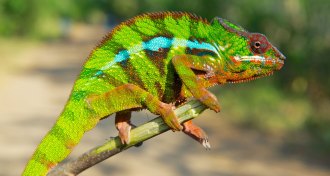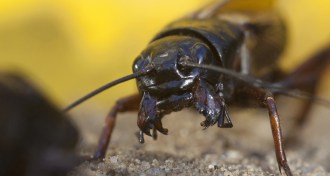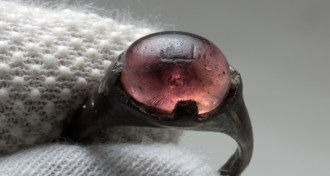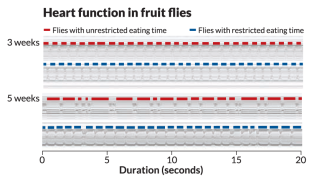All Stories
-
 Materials Science
Materials ScienceCopper-wire ‘metamirror’ reflects selectively
A metamaterial mirror reflects only a single wavelength of light, potentially leading to more compact and affordable radio antennas.
By Andrew Grant -
 Chemistry
ChemistryCooking up life’s ingredients, all in one pot
An interconnected series of chemical reactions with a few primordial chemicals can cook up all the necessary elements of life
By Beth Mole -
 Health & Medicine
Health & MedicineIn babies, turning down inflammation soothes the hurt
Babies don’t feel nerve pain because their immune systems tamp down inflammation.
-
 Quantum Physics
Quantum PhysicsFinding quantum entanglement in a crowd
Physicists have measured entanglement between pairs of photons within a macroscopic beam of light, a first step toward understanding how particles’ quantum connections lead to large-scale effects.
By Andrew Grant -
 Animals
AnimalsNanocrystals explain chameleons’ color shifts
Tiny crystals embedded in chameleons’ skin reflect specific wavelengths of light based on their position, explaining how chameleons change colors.
By Beth Mole -
 Animals
AnimalsA brain chemical tells when to fight or flee
Crickets tally the knocks they take in a fight, and flee when their brains release nitric oxide to tell them they’ve had enough.
-
 Archaeology
ArchaeologyRing brings ancient Viking, Islamic civilizations closer together
Ancient find fingers ninth century connection between Vikings and Islamic civilization.
By Bruce Bower -
 Astronomy
AstronomySuper-Earths may form in two ways
Rocky planets much heavier than Earth may form in different ways.
-
 Planetary Science
Planetary ScienceAurora shift confirms Ganymede’s ocean
New observations confirm the presence of a liquid saltwater ocean beneath the surface of Jupiter’s largest moon, Ganymede.
-
 Climate
ClimateArctic warming bolsters summer heat waves
Sagging storms brought on by rapid Arctic warming worsen summertime heat waves across the Northern Hemisphere.
-
 Life
LifeFor healthy eating, timing matters
Limiting eating times improves heart function in fruit flies.
-
 Planetary Science
Planetary ScienceChinese rover reveals moon’s layers
Radar imaging done by China’s Yutu lunar rover reveals that the moon’s geological history could be more complex than once thought.